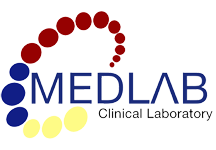Although a complete blood count can assist your physician in determining disease, it is not
typically a definitive diagnostic test. CBC results along with results of other blood tests, or
additional tests may be necessary.
A complete blood count (CBC) is a laboratory test which analyzes the number, size and shape of
blood cells in your body. These blood cells are made in bone marrow, the spongy tissue filling
the center of your bones. Bone marrow in the skull, sternum, ribs, vertebral column, and pelvis
produce these blood cells.
Each type of blood cell plays an important role in your body’s normal function. Values measured
by the CBC include red and white blood cell counts, hemoglobin concentration and platelet
counts. Experienced Medical Laboratory Technicians confirm the data from automated analyzers
helping your doctor detect blood diseases and abnormalities.
The data from these laboratory instruments tell us the following measurements:
‣ White Blood cell (WBC) count
White blood cells fight infections from pathogens (disease). They are measured in thousands per
cubic milliliter (K/uL) of blood. A WBC of 3.8 K/uL is 3,800 cells.
‣ Red Blood Cell (RBC) count
Red blood cells carry oxygen to and remove waste from the body’s tissues. These cells also
contain hemoglobin. Red blood cells are measured in millions per cubic millimeter (mil/uL) of
blood.
‣ Hemoglobin (HGB) value
Hemoglobin is a protein which gives red blood cells their color. Hemoglobin carries oxygen
from the lungs to the tissues and takes carbon dioxide (the waste) from the tissues to the lungs.
From the lungs, carbon dioxide is exhaled. Hemoglobin is measured in grams per deciliter (g/dL)
of blood.
‣ Hematocrit (HCT) value
The hematocrit is the percentage of red blood cells in relation to your total blood volume.
‣ Platelet count
Platelets help to stop bleeding by forming blood clots. They are measured in thousands per cubic
millimeter (m/uL) of blood. A platelet count of 200 K/uL is 200,000 cells.
Normal ranges of these measurements:
Each measurement in a complete blood count has a normal range that will be noted on your CBC
test results:
• WBC: 3.3-8.7 K/uL
• RBC: 3.93-5.69 M/uL
• HGB: 12.6-16.1 g/dL
• HCT: 38-47.7%
• Platelets: 147-347 K/uL
What can these measurements tell me?
If you’re otherwise healthy and have no sign or symptom of illness, results slightly outside the
normal range on a complete blood count may not be cause for concern and follow-up may not be
needed. However, if you’re treating or managing a disease or illness, results of a complete blood
count outside the normal range may indicate a need to change your care plan.
What if my test results are abnormal?
In some cases, if your results are significantly above or below the normal ranges, your doctor
may refer you to a specialist.
Results in the following areas above or below the normal range on a CBC may indicate:
hematocrit: The results of your red blood cell
count, hemoglobin and hematocrit are related
because they each measure aspects of your red
blood cells
If the measures in these three areas are lower
than normal, you have anemia. Anemia causes
fatigue and weakness. Anemia has many
causes, including low levels of certain
vitamins or iron, blood loss, or an underlying
condition.
A red blood cell count that’s higher than normal (erythrocytosis), or high hemoglobin or hematocrit levels, could point to an underlying
medical condition, such as heart disease.
A low white blood cell count (leukopenia) may be caused by a
medical condition, such as an autoimmune disorder that destroys
white blood cells, bone marrow problems or cancer. Certain medications also can cause white blood cell counts to drop.
If your white blood cell count is higher than normal, you may have an infection or inflammation.
Or, it could indicate that you have an immune system disorder or a bone marrow disease. A high
white blood cell count can also be a reaction to medication.
A platelet count which is lower than normal (thrombocytopenia) or higher than normal (thrombocytosis) is often a sign of an underlying medical condition or potentially a side effect from medication. If your platelet count is outside the normal range, you will likely need additional tests to find out the cause.
For more information and specifics about your complete blood count results or if they fall outside the normal range, talk to your physician.
